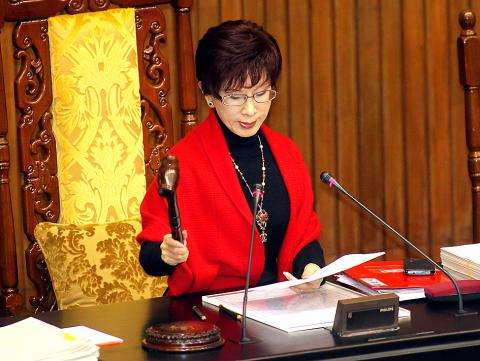Foreigners with HIV are no longer banned from entering, staying or residing in the nation, after amendments to the HIV Infection Control and Patient Rights Protection Act (人類免疫缺乏病毒傳染防治及感染者權益保障條例) were passed yesterday by the legislature.
The amendments include the removal of Article 18, which stipulated that people of foreign nationalities were subject to a request for a recent HIV test report if they wished to remain in the nation for more than three months and could be deported or have their visas and permits annulled if the test result was positive.
Chinese Nationalist Party (KMT) Legislator Yang Yu-hsin (楊玉欣) said that the UN has long argued that there is no evidence that restrictions on entry, stay and residence of HIV-positive people protect public health and “there are only 28 countries left with such restrictions on people living with HIV.”

Photo: CNA
Democratic Progressive Party Legislator Chao Tien-lin (趙天麟) and other lawmakers who proposed the amendments said that to move in line with the global trend on human rights protection, “there is no reason to impose restrictions, particularly on people with HIV.”
The US, South Korea and China have removed similar restrictions in recent years, the lawmakers added.
Another change to the law is the inclusion of an additional clause to Article 15 — in which it is stated that medical personnel “shall only collect blood of the individuals for HIV testing upon gaining the consent of the individuals concerned after going through counseling procedures” — that allows the collection and testing of certain groups of people without their or their legal representatives’ consent.
The designated groups include medical personnel and emergency response personnel, who are exposed to the risk of HIV infection in their work by coming into contact with blood and bodily fluids, individuals who have fallen unconscious and infants born to unidentified mothers.
The revised act also stipulates that the National Health Insurance (NHI) system will cover the costs of the medical treatment of people with HIV after two years of medications provided by the competent authority, which is the Ministry of Health and Welfare’s Centers for Disease Control (CDC).
The CDC will continue to partially shoulder the medical costs that are not covered by the NHI after two years of adherence to therapy to make sure that the patients do not unilaterally terminate the treatment out of financial concerns, Yang said.

The Taiwanese passport ranked 33rd in a global listing of passports by convenience this month, rising three places from last month’s ranking, but matching its position in January last year. The Henley Passport Index, an international ranking of passports by the number of designations its holder can travel to without a visa, showed that the Taiwan passport enables holders to travel to 139 countries and territories without a visa. Singapore’s passport was ranked the most powerful with visa-free access to 192 destinations out of 227, according to the index published on Tuesday by UK-based migration investment consultancy firm Henley and Partners. Japan’s and

NATIONAL SECURITY THREAT: An official said that Guan Guan’s comments had gone beyond the threshold of free speech, as she advocated for the destruction of the ROC China-born media influencer Guan Guan’s (關關) residency permit has been revoked for repeatedly posting pro-China content that threatens national security, the National Immigration Agency said yesterday. Guan Guan has said many controversial things in her videos posted to Douyin (抖音), including “the red flag will soon be painted all over Taiwan” and “Taiwan is an inseparable part of China,” while expressing hope for expedited “reunification.” The agency received multiple reports alleging that Guan Guan had advocated for armed reunification last year. After investigating, the agency last month issued a notice requiring her to appear and account for her actions. Guan Guan appeared as required,

Japan and the Philippines yesterday signed a defense pact that would allow the tax-free provision of ammunition, fuel, food and other necessities when their forces stage joint training to boost deterrence against China’s growing aggression in the region and to bolster their preparation for natural disasters. Japan has faced increasing political, trade and security tensions with China, which was angered by Japanese Prime Minister Sanae Takaichi’s remark that a Chinese attack on Taiwan would be a survival-threatening situation for Japan, triggering a military response. Japan and the Philippines have also had separate territorial conflicts with Beijing in the East and South China

A strong cold air mass is expected to arrive tonight, bringing a change in weather and a drop in temperature, the Central Weather Administration (CWA) said. The coldest time would be early on Thursday morning, with temperatures in some areas dipping as low as 8°C, it said. Daytime highs yesterday were 22°C to 24°C in northern and eastern Taiwan, and about 25°C to 28°C in the central and southern regions, it said. However, nighttime lows would dip to about 15°C to 16°C in central and northern Taiwan as well as the northeast, and 17°C to 19°C elsewhere, it said. Tropical Storm Nokaen, currently